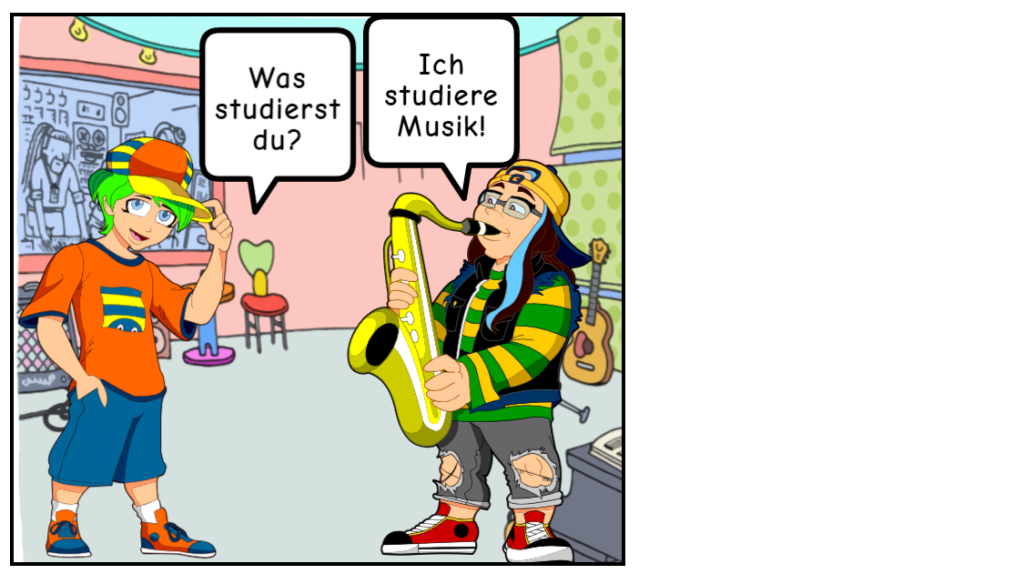5.1 Was studierst du?

Guten Tag!
Zum Aufwärmen machen wir unseren Tagesminiplausch und eine Wiederholung.
Wiederholung
In the previous lesson, you learned how to discuss when you do your hobby. Let’s review what you have learned.
Was ist dein Lieblingshobby? Wie oft machst du dein Hobby? Einmal die Woche, zweimal die Woche, jeden Tag? Take a minute to answer these questions in your written journal.
Lektionsüberblick
The first question you generally get about college is regarding your major (and minor). In this lesson, you will be introduced to a large number of majors (and minors). As with past lessons with larger lists of vocabulary, you should focus on committing to memory the words and phrases most relevant for you. With the rest of the words and phrases, you should learn them well enough to be familiar with them when reading or hearing them. In the end, you will be able to 1) say where you go to college, 2) recognize some majors, 3) say what your major is, and 4) say where you are in your degree.
1) Wo ich studiere
Read and listen to the comic below.
 |
|
Let’s practice.
Jetzt bist du dran!
2) Studienfächer
You will find that many of the fields of study look similar to their English counterpart. This is because they are cognates and came from the same original word. Look at the lists below categorized by cognates, near cognates, and other fields of studies that are not cognates. Which subjects are relevant to you? Find your major (and minors)!
Be sure to click through each slide and listen to the audio.
Let’s practice. Read the descriptions and choose the field of study being described. Wait a beat after each description and a new one will appear.
Jetzt bist du dran!
3) Was ich studiere…
Read and listen to the comic below.

Let’s practice.
Kleiner Hinweis
For those with a major (Hauptfach) and a minor (Nebenfach), the following structure will be helpful.
Ich studiere … im Hauptfach und … im Nebenfach.
Beispiel (Example): Ich studiere Biologie im Hauptfach und Deutsch im Nebenfach.
Jetzt bist du dran!
4) How to say what year of study you are in
In your conversations with native speakers, you will most likely be asked one of these questions. Listen to how they sound.
| In welchem Semester bist du? | |
| In welchem Jahr bist du? |
Read the Kleiner Hinweis below and then read and listen to some possible responses to the questions above.
Kleiner Hinweis
Most German speakers count the time in their degrees in semesters instead of years. Because of this discrepancy, we will show you both questions (what year and which semester), but you will most likely hear the question about semesters from German speakers and the question about the year from other learners of German or German speakers intimately familiar with the US system.
Because German speakers count in semesters instead of years, there are no equivalent words for freshman, sophomore, junior, and senior.
When you get the semester question, you can decide whether you want to answer in years or in semesters.
Jetzt bist du dran!
Österreich im Blickpunkt – Higher Education
Austrian institutions of higher education vary widely in terms of educational offerings, size, and structure. In Austria, one can attend a public university (eine staatliche Universität), a private college or university (eine Privathochschule oder -universität*), a university of applied science (eine Fachhochschule), or a teacher training college (pädagogische Hochschule). For EU citizens and locals, public universities are mostly free for a specified period of time, but students may pay a small student union fee of around 25 Euros. For non-EU citizens, tuition is typically higher. Of the almost 390,000 students** at Austrian institutions of higher education (in 2023), 76% are at staatlichen Universitäten, 3.5% are at Privathochschulen oder -universitäten, 15% are at Fachhochschulen, 5.5% are at pädagogischen Hochschulen.
For fun, you can explore the Universität Wien website to get a feel for the types of programs that they offer. Was würdest du studieren? What would you study?
*The Privatfachhochschule offers BA and MA degrees. The Privatuniversität additionally offers a Ph.D.
**Unlike post-secondary education in the US which largely centers on a college degree for many or even most jobs, German-speaking Europe offers a robust and often well-paid alternative path through apprenticeships. In 2023, there were 108,000 apprentices in Austria. This may seem like a small number compared to almost 400K students, but apprenticeships are generally completed in 2-3 years vs. a college degree.
Zum Schluß

*As you conclude this lesson, don’t forget to check Canvas!*

Media Attributions
- Informational text on Austrian universities sourced from the following Wikipedia entries: Liste der Universitäten und privaten Hochschulen in Österreich, Liste der Pädagogischen Hochschulen in Österreich, Liste der Fachhochschulen in Österreich, and www.studyinaustria.at.
Media Attributions
- Private: 1010-at-banner-large
- Comic made at www.MakeBeliefsComix.com
- 5.1 Was studierst du

